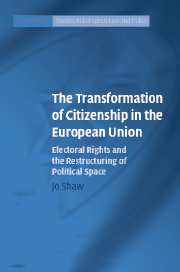 The Transformation of Citizenship in the European Union
The Transformation of Citizenship in the European Union Book contents
- Frontmatter
- Dedication
- Contents
- List of figures
- List of tables
- Preface and acknowledgments
- PART I Electoral rights in legal and political context
- PART II The past, present and future of EU electoral rights
- 4 The emerging constitutional framework for electoral rights in the era of European citizenship
- 5 EU electoral rights since 1993
- 6 Electoral rights for Union citizens: looking to the future
- 7 Electoral rights for third country nationals: what role for the European Union?
- PART III The contestation of electoral rights in the Member States of the European Union
- PART IV Conclusions
- Bibliography
- Index
4 - The emerging constitutional framework for electoral rights in the era of European citizenship
from PART II - The past, present and future of EU electoral rights
Published online by Cambridge University Press: 05 June 2015
- Frontmatter
- Dedication
- Contents
- List of figures
- List of tables
- Preface and acknowledgments
- PART I Electoral rights in legal and political context
- PART II The past, present and future of EU electoral rights
- 4 The emerging constitutional framework for electoral rights in the era of European citizenship
- 5 EU electoral rights since 1993
- 6 Electoral rights for Union citizens: looking to the future
- 7 Electoral rights for third country nationals: what role for the European Union?
- PART III The contestation of electoral rights in the Member States of the European Union
- PART IV Conclusions
- Bibliography
- Index
Summary
Introduction
This chapter investigates the historical origins of the electoral rights guaranteed under European Union law and the development of a constitutional framework for these rights, in the wider context of the evolution of European citizenship in legal and political terms. It is the first of four chapters on the past, present and possible future of electoral rights in the European Union. In essence, the story of electoral rights in the EU can be seen as a microcosm of some of the key variables at play within the story of EU integration more generally: the shift from a concern with economic questions to a concern with political and social questions; the role of legal rights in structuring key political developments; the gradual hardening of ‘soft’ institutions into hard legal and constitutional form, with all the attendant questions raised about legitimacy and effectiveness of such institutions; and finally the question of national implementation and the interaction between EU developments and the national constitutions and constitutional traditions of the Member States.
In setting the scene for the study of electoral rights for non-nationals, the basic principles of citizenship of the Union were presented and discussed in Chapter 1. In Chapter 2, I took the argument further by presenting the tension existing within citizenship of the Union between the market and the polity. Is Union citizenship at root an economic concept, or a political one? The post-Maastricht case law of the Court of Justice on citizenship of the Union was highlighted as arguably moving the concept away from a primary focus on the economic nexus between the free-moving EU citizen and the host Member State, and I will return to that specific question when referring to the post-Maastricht developments in citizenship as one context in which to draw conclusions about the current state of EU electoral rights in Chapter 5.
- Type
- Chapter
- Information
- The Transformation of Citizenship in the European UnionElectoral Rights and the Restructuring of Political Space, pp. 93 - 121Publisher: Cambridge University PressPrint publication year: 2007


